外研版八年级英语下册知识点总结.doc
八下外研版英语知识点梳理

八下外研版英语知识点梳理八年级下册外研版英语是英语学习的一个重要阶段,本文将为您梳理八下外研版英语的知识点,助您在学习英语过程中能够更好地掌握相关知识。
Unit 1 School life本单元主要介绍了学校生活中的一些常见场景和相关词汇,例如:考试、课程表、学校设施等。
学习重点是正确理解和使用有关学校生活的日常用语,提高听说能力。
Unit 2 Growing pains本单元主要介绍了青少年成长中面临的困扰和压力,例如:学业压力、亲子关系、归属感等。
学习重点是学会表达自己的感受,并尝试提出解决问题的建议。
Unit 3 Travel journal本单元主要介绍了旅行日记的撰写方法和旅行经历的交流,通过学习旅行相关的词汇和表达方式,提高学生的写作和口语能力。
Unit 4 Wild animals本单元主要介绍了一些野生动物的特征和保护。
学习重点是掌握常见动物的名称和特征,并了解野生动物保护的重要性。
Unit 5 Food and restaurants本单元主要介绍了餐饮相关的词汇和情景对话,例如:点餐、支付等。
学习重点是学会使用英语进行简单的餐饮交流,提高听说能力。
Unit 6 Inventors and inventions本单元主要介绍了一些发明家和他们的发明,通过学习相关词汇和阅读材料,了解科技对人类生活的影响并激发学生的创造力。
Unit 7 TV programmes本单元主要介绍了电视节目的种类和观看习惯,学习重点是学会用英语描述不同类型的电视节目,提高阅读和听说能力。
Unit 8 Water本单元主要介绍了水资源的重要性和节约用水的方法。
学习重点是学会提出合理的建议,并倡导节约用水的观念。
Unit 9 A busy day本单元主要介绍了一天中不同活动的时间安排和日常生活的表达。
学习重点是学会询问时间、描述日常活动,并提高听说能力。
Unit 10 Colours本单元主要介绍了颜色的基本概念和颜色在生活中的运用。
外研版英语八年级下册知识点总结
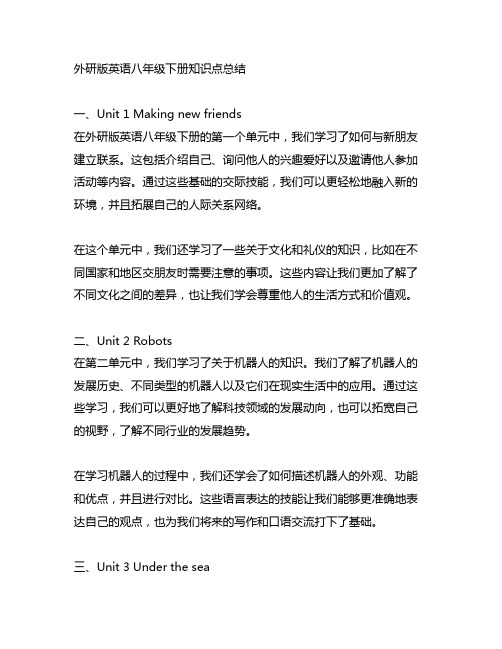
外研版英语八年级下册知识点总结一、Unit 1 Making new friends在外研版英语八年级下册的第一个单元中,我们学习了如何与新朋友建立联系。
这包括介绍自己、询问他人的兴趣爱好以及邀请他人参加活动等内容。
通过这些基础的交际技能,我们可以更轻松地融入新的环境,并且拓展自己的人际关系网络。
在这个单元中,我们还学习了一些关于文化和礼仪的知识,比如在不同国家和地区交朋友时需要注意的事项。
这些内容让我们更加了解了不同文化之间的差异,也让我们学会尊重他人的生活方式和价值观。
二、Unit 2 Robots在第二单元中,我们学习了关于机器人的知识。
我们了解了机器人的发展历史、不同类型的机器人以及它们在现实生活中的应用。
通过这些学习,我们可以更好地了解科技领域的发展动向,也可以拓宽自己的视野,了解不同行业的发展趋势。
在学习机器人的过程中,我们还学会了如何描述机器人的外观、功能和优点,并且进行对比。
这些语言表达的技能让我们能够更准确地表达自己的观点,也为我们将来的写作和口语交流打下了基础。
三、Unit 3 Under the sea第三单元让我们深入了解了海洋生物的知识,比如不同种类的鱼类、海洋植物、以及生活在海洋里的各种生物。
通过学习这些内容,我们可以更好地认识到保护海洋环境的重要性,也让我们了解了自然界的神奇与多样性。
我们在这个单元中也学会了如何描述海底世界的景象,并且学会了使用形容词和副词来增加句子的丰富度。
这些技能对于我们的写作和口语表达都非常重要,可以让我们的语言更加生动和精彩。
四、Unit 4 Wild animals在这个单元,我们学习了如何描述野生动物、它们的特点及栖息环境。
通过对野生动物的了解,我们可以更好地保护和珍惜自然资源,也可以更深入地了解动物世界的精彩之处。
我们还学会了如何表达对动物的喜爱和保护之情,如何呼吁他人一起来保护野生动物。
这些内容培养了我们的社会责任感和环保意识,也让我们学会用语言来表达自己的观点和态度。
最新外研版八年级英语下册知识点汇总

最新外研版英语八年级下册知识点总结Module 1 Feelings and impressionsUnit 11. What a delicious smell? Smell:一股气味(可数名词)_____ good advice! It’s so helpful to us. (wh at / How)_____ interesting the story is! (What / How)2. nice:adj. 美味的,友好的,令人愉快的nice weather: 好天气be nice to sb.:对某人友好a nice trip: 一次令人愉快的旅行The cookie tastes nice. 这块饼干尝起来美味。
3. would like 比want 语气更委婉。
----Would you like to stay here with us?---- Yes, I’d like / love to.4. lovely: 令人愉快的,可爱的修饰人或物a lovely afternoon / girllively: 活泼的,生动的a lively lesson:一堂生动的课5. I’m afraid that +从句: 恐怕(表示歉意或让对方失望的情况)I’m afraid that I can’t come to your party tomorrow.6. 1) a bit = a little:有点儿,有点后接/形容词/副词形容词/副词的比较级I feel a bit thirsty now.After the rain, people feel a bit / a little cooler.2) a little + 不可数名词:There is a little time left.a bit of + 不可数名词:There is a bit of water in the bottle.7. have a try: 试一试have a / an + 名词have a swim:游泳have a break:休息have a shower:洗沐浴8. I have a sweet tooth. 我喜欢吃甜食。
八下外研版英语知识点梳理

八下外研版英语知识点梳理八下外研版英语知识点梳理外研版八年级下册英语是英语学习的重要阶段,掌握好其中所有知识点,对于我们学好英语非常有帮助。
本文将从语法、词汇、阅读、写作四个方面系统地梳理外研版八年级下册英语中的重点知识点。
语法1. 一般现在时:①主语+动词原型 (第三人称单数动词要加s或es)②肯定句:主语+am/is/are+形容词/名词/副词等③否定句:主语+am/is/are+not+形容词/名词/副词等④疑问句:Is/Am/Are+主语+形容词/名词/副词等2. 一般过去时:①主语+动词原形+ed②肯定句:主语+was/were+形容词/名词/副词等③否定句:主语+was/were+not+形容词/名词/副词等④疑问句:Was/were+主语+形容词/名词/副词等3. 情态动词①can、could表示能力②may、might表示可能性③must、have to表示必须性④should、ought to表示应该性4. if条件句①一般现在时和将来时:if +主语+一般现在时,主句将来时②一般过去时:if +主语+一般过去时,主句would/过去时③虚拟语气:if+主语+过去完成时,主句would/过去时完成5. 名词性从句①主语从句:从句作主语②宾语从句:从句作宾语③表语从句:从句作表语④同位语从句:同位语从句由以下结构引导:that、whether、who、whom、which、what和how等。
词汇1. 动词不规则变化常见的动词不规则变化有:①come →came ②go→went ③see→saw ④eat→ate2. 同义词、反义词①good→great②bad→worse③happy→pleased④quiet→silent⑤begin→start阅读1. 短文阅读阅读短文时,首先要抓住文章的主旨,把握作者的意图。
其次,根据文章中出现的生词和短语,注意上下文的语境,理解文章中的每一个段落。
八下外研版英语知识点梳理

八下外研版英语知识点梳理八年级下册是外研版英语教材的第二学期内容,包含了Unit 5到Unit 12的内容。
下面是对这些知识点的梳理:Unit 5 Music1. 介词for的用法:用于表示做事的原因、目的或目标。
例如:She practiced for hours. 她练习了几个小时。
2.一般将来时的用法:表示将来一些时间要发生的动作。
例如:I will give a speech tomorrow. 我明天要做一个演讲。
3. 省略动词be的用法:在口语中经常省略动词be,特别是在情态动词后面。
例如:You should more polite. 你该更加礼貌。
Unit 6 Films and TV programs1.一般过去时的用法:表示过去一些具体时间发生的动作或存在的状态。
例如:I watched a movie last night. 昨晚我看了一部电影。
2.疑问代词和疑问副词的用法:用于构成疑问句,代替被问的人或物,询问具体信息。
例如:Who is your favorite actor? 你最喜欢的演员是谁?3.动词不定式的用法:用于表示动作或状态的目的、用途。
例如:He bought a camera to take pictures. 他买了一台相机拍照。
Unit 7 Saving the Earth1. 含有比较级的句子的构成:由形容词或副词的比较级+than构成,表示两者之间的比较。
例如:She is taller than her sister. 她比她姐姐高。
2. 被动语态的构成:由助动词be加上及物动词的过去分词构成,表示被动的动作或状态。
3.定义性从句的用法:用来给出一个事物的定义或说明。
例如:A volcano is a mountain that erupts. 火山是一座喷发的山。
Unit 8 Body and Health1. 情态动词should的用法:表示应该或应当做事。
外研版八年级英语下册重要知识点归纳

八年级下册英语重要知识点归纳M1重要语法:感官性系统词:feel(摸起来)、look(看起来)、smell(闻起来)、taste(尝起来)sound(听起来),后接形容词作表语,不能接副词。
构成疑问句或否定句要借助助动词。
The silk dress feels soft.The flowers look very beautiful.Does it smell nice?be noisy.The song doesn’t sound2. What a d elicious smell!多么香啊!对名词或名词短语感叹用what感叹句结构:①What+ a/an+形容词+单数可数名词+(主语+谓语)!What an interesting book it is!②What+形容词+不可数名词/复数名词+(主语+谓语)!What bad weather it is today!What good students they are!对形容词、副词或动词感叹用how③ How +形容词/副词+主语+谓语!How fast he is running!How delicious it smells!How I miss the days we spent together!我多么怀念我们一起度过的日子!句子:恐怕……I’m afraid he has no time today.3.I’m afraid+4. be d one做好了Is your homework d one?你的作业做好了吗?Dinner is done!晚饭做好了!5. have a try试一试;尝一尝6.have a sweet tooth喜好甜食7.thanks for=thank you for+名词/动词-ing。
因……而感谢你。
Thanks for your help.=Thanks for helping me .Thank you for inviting me to your party.…的来信8. hear from…=get /receive aletter from收到……o sth.迫不及待去做某事I can’t wait to see you.9.can’t wait to d10.人+ spend+时间(in)d oing sth.。
(完整)新外研版八年级英语(下册)重点知识点总结,推荐文档.doc

WORD 格式整理外研版八年级英语下册重点知识点Module 1语法:系动词 :一是 (be: am ,is ,are ,been ,was ,were), 一觉得 (feel),一好像 (seem),一保持 (keep) , 三变化 (turn, become, get ), 四起来 (smell, sound ,look ,taste), 后跟形容词 .知识点: 1.would like =want ,would like to do sth=want to do sth .想要做某事would like sb. to do sth .=want sb. to do sth想要某人做某事would you like ...?其后用some不用any .句子:Would you like to do sth .肯定回答 :Yes ,please ./sure ,thanks ./Yes ,I’d like to./Yeso ,I’d love t否定回答 :No, thanks ./Sorry ,I’m afraid I can’t .2.try to do sth . 尽力做某事 ;试图做某事 ;设法做某事 ,但不一定成功 .否定式 :try not to do sth.try doing sth . 试着做某事 ,看看会发生什么情况.have a try 试一试3.a bit 与 a little1)两者修饰动词 ,形容词 ,副词或比较级,2)a little可以直接修饰不可数名词,相当于 a bit of4.have a try 试试看 , have a look 看一看have a headache 头疼have a rest 休息have a meeting开会have a good time玩得愉快have a fever 发烧5.lots of =a lot of很多,大量,常用于肯定句中.既可修饰可数相当于many , 又可修饰不可数,相当于 much . a lot 相当于 very much ,多与动词连用,修饰形容词 ,副词的比较级 .6.提出建议 :1)Let ’ s do sth让我.们做吧 .2)How about /what about doing sth ?做..怎么样3)Why not do sth ? 为什么不?4)Would you like to do你愿意 ?做 .吗?5)Shall we do我 ?们做好吗?6)You ’ d better(not) do你..最好 (不 )做某事 .7.Thanks for sth. =Thank you for sth. 因而感谢 .后 V+ing . Thanks to 幸亏 ,由于 ,归功于 .8.leave a message 留个口信 , take/have a message for sb. 给某人带个口信.9.hear from sb.=get /receive a letter from sb .收到的来信hear about /of得悉,听说Hear out听完hear to 同意10.can ’ t wait to do sth迫.不及待做某事wait for等候 ,后接等待的对象,名词或代词WORD 格式整理wait to do sth . 等着做某事11.三到达 :arrive at ( 小地方 ),arrive in ( 大地方 ),get to =reach 注意 :跟 home ,here ,there 等副词时 , 不加介词 .12.quite 相当 ,很 ,相当于 very,区别 , quite a ../ quite an .. 而 very 只能放在 a /an 后13.with有,带有;和一起;使用等.反义词without14. lovely:令人愉快的,可爱的修饰人或物 a lovely afternoon / girllively:活泼的,生动的 a lively lesson: 一堂生动的课16.四个花费 : take: It takes sb. some time to do sth. /It took sb .some time to do sth .Spend : Sb. spend some time/ money on sthSb. spend some time/ money (in) doing sth.Pay:Sb. pay some money for sth.cost :sth cost sb .some money .17.四个也 :as well 肯定 ,句末 ,不用逗号too, 肯定 ,句末 ,逗号可有可无.either: 否定句末 ,also ,肯定句中 ,行前 be 后 .18.proud .adj. be proud of为而感到骄傲be proud to do sth . 做某事很自豪 .pride. n.take pride in为感.到自豪;the pride of的骄傲. .19.How do you feel about对 ?感觉如何?与How do you like ?20.at first起初,开始,常位于句首或句末,反义词 .at last 最后 ,终于first of all , 首先 ,用作插入语 ,说明顺序 ,后接 next ,then , at first , 指刚开始做某事的时候 ,暗示后来的情况有所改变 .21.few /a few 修饰可数名词 ,little /a little修饰不可数名词,有 a 表示有 ,没有 a 表示没有 .22.way 的短语 :in this way 用这种方式 , in the right way 用正确的方法 , the way of 做 ..的方式on the way to在去的路上by the way 顺便说一下 .WORD 格式整理23.be afraid of害怕,后接名词,代词或动名词be afraid to do sth . 害怕做某事24.each other互相25.be nervous about对感到紧张26.问外貌 :What+do/does /did + 主语 +look like ?问性格:What +be +主语+like ?27.be friendly to sb.对某人友好-28.be good at =do well in擅长,后跟doing sth .或名词。
外研版初中八年级英语下册所有重点知识考点全总结
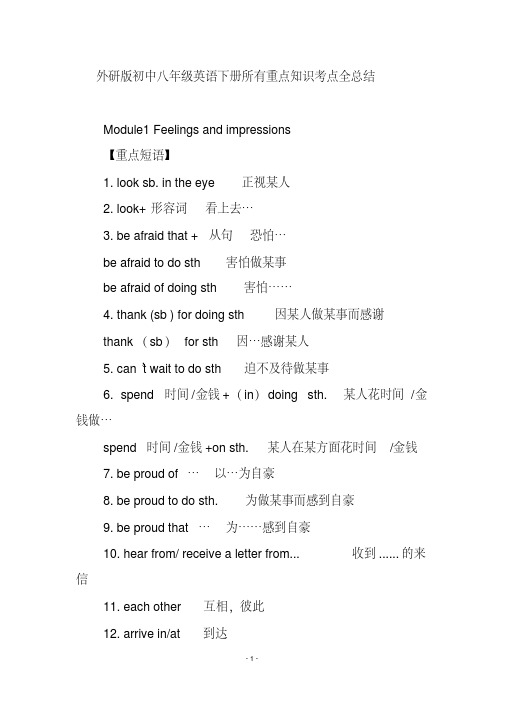
外研版初中八年级英语下册所有重点知识考点全总结Module1 Feelings and impressions【重点短语】1. look sb. in the eye 正视某人2. look+形容词看上去…3. be afraid that +从句恐怕…be afraid to do sth 害怕做某事be afraid of doing sth 害怕……4. thank (sb ) for doing sth 因某人做某事而感谢thank(sb)for sth 因…感谢某人5. can’t wait to do sth 迫不及待做某事6. spend 时间/金钱+(in)doing sth. 某人花时间/金钱做…spend 时间/金钱+on sth. 某人在某方面花时间/金钱7. be proud of…以…为自豪8. be proud to do sth. 为做某事而感到自豪9. be proud that…为……感到自豪10. hear from/ receive a letter from... 收到......的来信11. each other 互相,彼此12. arrive in/at 到达13. be good at 擅长,善于14. have a try 尝试15. on top 在上面,处于优势16. in the middle 在中间17. as well 也;还18. in the right way 以正确的方式19. be excited about 对...兴奋20. shake hands 握手21. close to 离......近【重点句型】1. 它闻起来不新鲜。
It doesn’t smell fresh.2. 每种东西都(尝起来)甜滋滋的。
Everything tastes so sweet.3. 多好闻的味道啊!What a delicious smell.4. ——你想来点尝尝吗?——好的,谢谢。
外研版英语八年级下册Module1模块知识点归纳
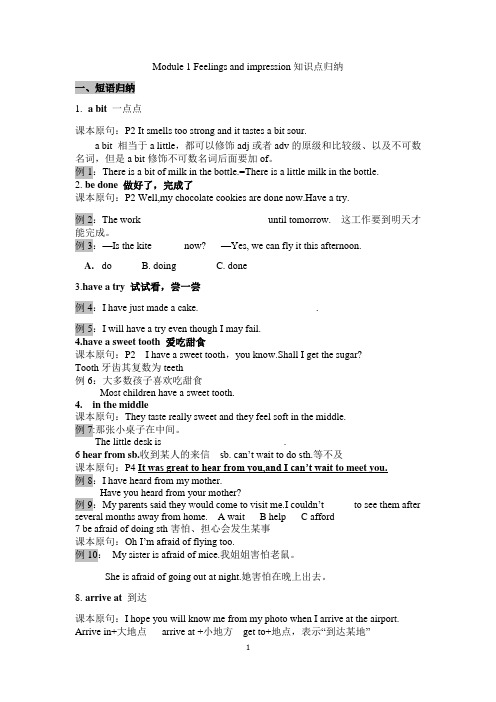
Module 1 Feelings and impression知识点归纳一、短语归纳1. a bit一点点课本原句:P2 It smells too strong and it tastes a bit sour.a bit 相当于a little,都可以修饰adj或者adv的原级和比较级、以及不可数名词,但是a bit修饰不可数名词后面要加of。
例1:There is a bit of milk in the bottle.=There is a little milk in the bottle.2. be done 做好了,完成了课本原句:P2 Well,my chocolate cookies are done now.Have a try.例2:The work _______ _________ ________until tomorrow. 这工作要到明天才能完成。
例3:—Is the kite ______now? —Yes, we can fly it this afternoon.A.doB. doingC. done3.have a try 试试看,尝一尝例4:I have just made a cake. ______ ______ ______.例5:I will have a try even though I may fail.4.have a sweet tooth 爱吃甜食课本原句:P2 I have a sweet tooth,you know.Shall I get the sugar?Tooth牙齿其复数为teeth例6:大多数孩子喜欢吃甜食Most children have a sweet tooth.4.in the middle课本原句:They taste really sweet and they feel soft in the middle.例7:那张小桌子在中间。
(完整版)八年级下英语(外研版)全部知识点总复习.docx

外研版八年英下册短知点集MODULE1五种句歌决英句,五种构型,句子后,构自分明,表主状,即主系表,主关与主,二者需分清,作象人和物,是加直,二位置可互,介to,for 心,句子已有主,再方完整,加上足,二者构成复合。
1、主+不及物(SV)不及物,不能,但有些要接状意才完整。
2、主 +系 +表( SVP)系: be ,look, seem ,become, feel , get ,turn ,grow,smell ,taste , keep, sound3、主+及物+(SVO)4、主 +及物 +接 +直接( SVOO)直接在前,加for 或 to 接接。
give, show , send, bring , pass, lend ,leave ,hand , feel, return, promise ,refuse, throw 用 to.make ,buy ,do ,get ,play ,order, sing, pay 用 for .5、主 +及物 + +足( SVOC)6、there be 句型。
tidy up 收拾,fan 扇, fan oneself ,某人自己扇,fan the flame 煽情, a movie fan , 影迷,un 反前,tidy-untidy, happy-unhappy ,comfortable-uncomfortable at least至少,祈使句,肯定以原形开,反用 will you ?/won’t you?,否定用 Don’t+原形,反用 will you ? ,Let’s⋯用 shall we?take up占据,代放中take away拿走 ,take sth. back,收回某物take ⋯.to ⋯把⋯到⋯.take off 脱下,起take place生 ,take a rest 休息一下 , a bit ,a little ,作状形/副可互a bit of =a little, 有点儿,修不可数名on time 按 ,in time 及 ,from time to time 有 ,a long time 很,for the first time 首次 ,have a good time 玩,得高be/get /become interested in主是人,某人某事生趣指人的不定代: somebody/someone, everybody/everyone , anybody/anyone, nobody/no one指物的不定代 ,anything, something, everything, nothing play the violin ; ,play +the+器, play+球,世上独一无二的加 the 前面出的再次出用 the make+ +足 (使..于某种状 ,地位 )make sb.do sth.使某人做某事, make sb/sth + 形使某人 /某物⋯后接不定式作,不要 to 的有,一感 feel,二听 hear, listen to ,三 have, let, make,四看 see, look at ,watch ,notice,半帮助 help,make sb. sth=make sth for sb.某人做某事, make money ,make a living 生, make trouble 引起麻,make friends with sb.与某人交朋友,make war开,make a fire 生火,make a face做鬼,make ..from 用..制成(用被)be made of用..制成(用被)make fun of 取笑,与⋯开玩笑,make roomfor ⋯地方, make up 造, make up one’s mind 决心,拿定主意,在完成:表去生或已完成的某一作,在造成的影响和果,或持到在的作。
(外研版)英语八年级下册总复习知识点考点
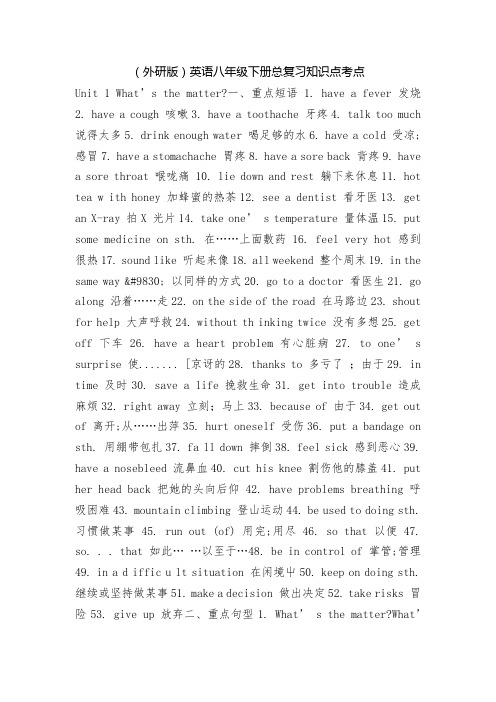
(外研版)英语八年级下册总复习知识点考点Unit 1 What’s the matter?一、重点短语 1. have a fever 发烧2. have a cough 咳嗽3. have a toothache 牙疼4. talk too much 说得太多5. drink enough water 喝足够的水6. have a cold 受凉;感冒7. have a stomachache 胃疼8. have a sore back 背疼9. have a sore throat 喉咙痛 10. lie down and rest 躺下来休息11. hot tea w ith honey 加蜂蜜的热茶12. see a dentist 看牙医13. get an X-ray 拍X 光片14. take one’ s temperature 量体温15. put some medicine on sth. 在……上面敷药16. feel very hot 感到很热17. sound like 听起来像18. all weekend 整个周末19. in the same way ♦ 以同样的方式20. go to a doctor 看医生21. go along 沿着……走22. on the side of the road 在马路边23. shout for help 大声呼救24. without th inking twice 没有多想25. get off 下车26. have a heart problem 有心脏病27. to one’ s surprise 使....... [京讶的28. thanks to 多亏了;由于29. in time 及时30. save a life 挽救生命31. get into trouble 造成麻烦32. right away 立刻;马上33. because of 由于34. get out of 离开;从……出萍35. hurt oneself 受伤36. put a bandage on sth. 用绷带包扎37. fa ll down 摔倒38. feel sick 感到恶心39. have a nosebleed 流鼻血40. cut his knee 割伤他的膝盖41. put her head back 把她的头向后仰42. have problems breathing 呼吸困难43. mountain climbing 登山运动44. be used to doing sth. 习惯做某事 45. run out (of) 用完;用尽46. so that 以便47. so. . . that 如此……以至于…48. be in control of 掌管;管理49. in a d iffic u lt situation 在闲境屮50. keep on doing sth. 继续或坚持做某事51. make a decision 做出决定52. take risks 冒险53. give up 放弃二、重点句型1. What’ s the matter?What’s the matter with you?= What’s the trouble with you?= What’s wrong with you?你怎么了?2. W hat should she do?她该怎么办呢?Should I take my temperature?我应该量一下体温吗?主语+ should/shouldn’t + 动词原形. ..①You should lie down and rest.你应该躺下休息一会儿。
外研社八年级下册英语各模块知识点

外研社八年级下册英语各模块知识点外研社八年级下册英语共分为六个模块,分别为:Unit 1 How often do you exercise?,Unit 2 What's the matter?,Unit 3 What are you doing for vacation?,Unit 4 I used to be afraid of the dark,Unit 5 It must belong to Carla. 和 Unit 6 A field trip. 下面将对每个模块的知识点进行详细介绍。
Unit 1 How often do you exercise?本单元主要围绕运动频率展开话题,其中包括以下知识点:1. 动词的频率副词:always, usually, often, sometimes, rarely, never等2. 一般现在时的用法:表示经常性的动作或状态,以及客观、真实的事实3. 疑问句的构成和回答:如How often do you exercise? I exercise once a week.4. 词汇:exercise, jog, swim, ride a bike等Unit 2 What's the matter?本单元主要围绕疾病和健康展开话题,其中包括以下知识点:1. 生病时用语:如I have a headache/ a fever/ a cold等2. 动词不定式的用法:如I need to see a doctor./ He wants to stay in bed.3. 疑问句的构成和回答:如What's the matter? I have a sore throat.4. 词汇:sick, flu, sore throat, cough等Unit 3 What are you doing for vacation?本单元主要围绕假期活动展开话题,其中包括以下知识点:1. 现在进行时的用法:表示现在正在进行的动作2. 问答句的构成和回答:如What are you doing for vacation? I'm going to visit my grandparents.3. 词汇:visit, hike, camp, travel等Unit 4 I used to be afraid of the dark本单元主要围绕过去的经历和变化展开话题,其中包括以下知识点:1. 过去式的用法和构成:如I played basketball yesterday./ She watched TV last night.2. used to的用法:表示过去的习惯和经历3. 问答句的构成和回答:如Did you use to be afraid of the dark? Yes, I did.4. 词汇:afraid, explore, adventure, brave等Unit 5 It must belong to Carla.本单元主要围绕失物招领和描述物品展开话题,其中包括以下知识点:1. 指示代词的用法:如This is my book./ That is his pen.2. 情态动词must的用法:表示推测和肯定3. 问答句的构成和回答:如Whose jacket is this? It mustbelong to Carla.4. 词汇:belong, describe, recognize, valuable等Unit 6 A field trip本单元主要围绕校外教育活动展开话题,其中包括以下知识点:1. 现在完成时的用法:表示过去发生的动作对现在造成的影响2. 副词yet的用法:表示还没有完成的意思3. 问答句的构成和回答:如Have you ever been to Beijing? Yes, I have./ No, I haven't yet.4. 词汇:field trip, explore, discover, experience等以上就是外研社八年级下册英语各模块知识点的详细介绍。
(完整word版)外研八年级下册知识点、语法总结
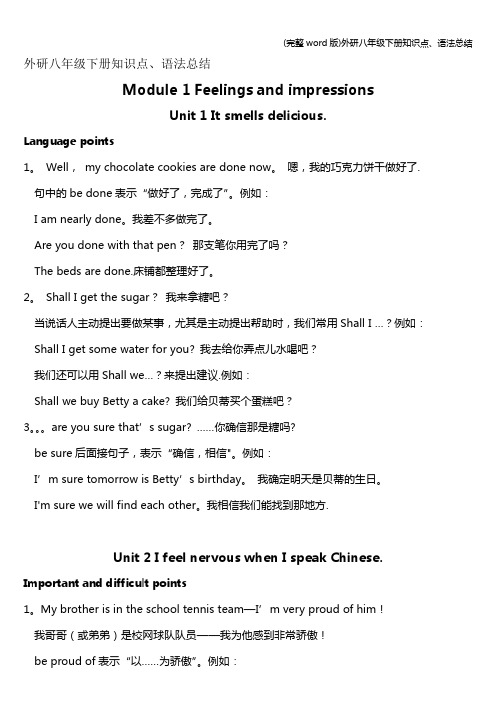
外研八年级下册知识点、语法总结Module 1 Feelings and impressionsUnit 1 It smells delicious.Language points1。
Well,my chocolate cookies are done now。
嗯,我的巧克力饼干做好了.句中的be done表示“做好了,完成了”。
例如:I am nearly done。
我差不多做完了。
Are you done with that pen?那支笔你用完了吗?The beds are done.床铺都整理好了。
2。
Shall I get the sugar?我来拿糖吧?当说话人主动提出要做某事,尤其是主动提出帮助时,我们常用Shall I …?例如:Shall I get some water for you? 我去给你弄点儿水喝吧?我们还可以用Shall we…?来提出建议.例如:Shall we buy Betty a cake? 我们给贝蒂买个蛋糕吧?3。
are you sure that’s sugar? ……你确信那是糖吗?be sure后面接句子,表示“确信,相信"。
例如:I’m sure tomorrow is Betty’s birthday。
我确定明天是贝蒂的生日。
I'm sure we will find each other。
我相信我们能找到那地方.Unit 2 I feel nervous when I speak Chinese. Important and difficult points1。
My brother is in the school tennis team—I’m very proud of him!我哥哥(或弟弟)是校网球队队员——我为他感到非常骄傲!be proud of表示“以……为骄傲”。
例如:We are so proud of her for telling the truth。
外研版英语八年级下册Module1模块知识点归纳

Module 1 Feelings and impression知识点归纳知识点归纳一、短语归纳1.a bit一点点一点点课本原句:P2 It smells too strong and it tastes a bit sour. a bit 相当于a little,都可以修饰adj或者adv的原级和比较级、以及不可数名词,但是a bit修饰不可数名词后面要加of。
例1:There is a bit of milk in the bottle.=There is a little milk in the bottle. 2. be done 做好了,完成了课本原句:P2 Well,my chocolate cookies are done now.Have a try. 例2:The work _______ _________ ________until tomorrow. 这工作要到明天才能完成。
能完成。
例3:—Is the kite ______now? —Yes, we can fly it this afternoon. A.do B. doing C. done 3.have a try 试试试试看,尝一尝例4:I have just made a cake. ______ ______ ______. 例5:I will have a try even though I may fail. 4.have a sweet tooth 爱吃甜食课本原句:P2 I have a sweet tooth,you know.Shall I get the sugar? Tooth牙齿其复数为teeth :大多数孩子喜欢吃甜食例6:大多数孩子喜欢吃甜食Most children have a sweet tooth. 4.in the middle 课本原句:They taste really sweet and they feel soft in the middle. 那张小桌子在中间。
外研八年级下册知识点、语法总结(K12教育文档)
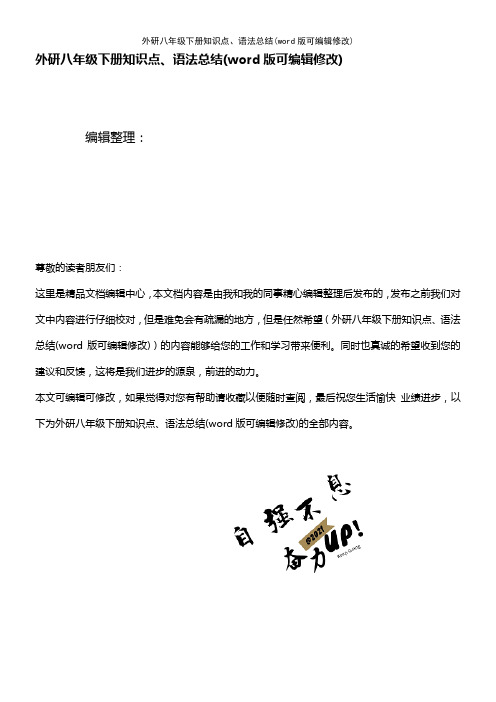
外研八年级下册知识点、语法总结(word版可编辑修改)编辑整理:尊敬的读者朋友们:这里是精品文档编辑中心,本文档内容是由我和我的同事精心编辑整理后发布的,发布之前我们对文中内容进行仔细校对,但是难免会有疏漏的地方,但是任然希望(外研八年级下册知识点、语法总结(word版可编辑修改))的内容能够给您的工作和学习带来便利。
同时也真诚的希望收到您的建议和反馈,这将是我们进步的源泉,前进的动力。
本文可编辑可修改,如果觉得对您有帮助请收藏以便随时查阅,最后祝您生活愉快业绩进步,以下为外研八年级下册知识点、语法总结(word版可编辑修改)的全部内容。
外研八年级下册知识点、语法总结Module 1 Feelings and impressionsUnit 1 It smells delicious.Language points1. Well, my chocolate cookies are done now. 嗯,我的巧克力饼干做好了。
句中的be done表示“做好了,完成了”.例如:I am nearly done。
我差不多做完了。
Are you done with that pen?那支笔你用完了吗?The beds are done。
床铺都整理好了。
2。
Shall I get the sugar? 我来拿糖吧?当说话人主动提出要做某事,尤其是主动提出帮助时,我们常用Shall I …?例如:Shall I get some water for you?我去给你弄点儿水喝吧?我们还可以用Shall we…?来提出建议。
例如:Shall we buy Betty a cake?我们给贝蒂买个蛋糕吧?3。
are you sure that’s sugar? ……你确信那是糖吗?be sure后面接句子,表示“确信,相信”。
例如:I’m sure tomorrow is Betty’s birthday。
(完整版)外研版英语八年级下册知识点总结.docx
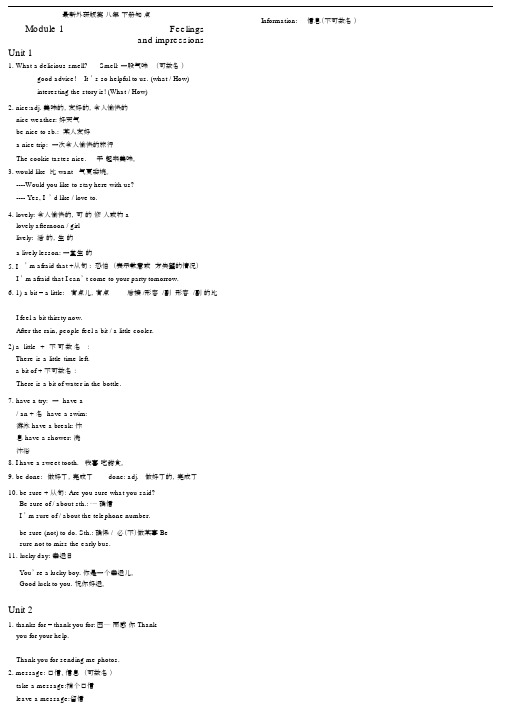
最新外研版英八年下册知点Information:信息(不可数名)Module 1Feelingsand impressionsUnit 11. What a delicious smell?Smell: 一股气味(可数名)_____ good advice! It ’ s so helpful to us. (what / How)_____ interesting the story is! (What / How)2.nice:adj. 美味的,友好的,令人愉快的nice weather: 好天气be nice to sb.: 某人友好a nice trip: 一次令人愉快的旅行The cookie tastes nice. 干起来美味。
3.would like 比 want 气更委婉。
----Would you like to stay here with us?---- Yes, I ’ d like / love to.4.lovely: 令人愉快的,可的修人或物 alovely afternoon / girllively: 活的,生的a lively lesson: 一堂生的5.I’ m afraid that +从句 : 恐怕(表示歉意或方失望的情况)I ’ m afraid that I can’ t come to your party tomorrow.6.1)a bit = a little: 有点儿,有点后接 /形容 /副形容 /副的比I feel a bit thirsty now.After the rain, people feel a bit / a little cooler.2)a little + 不可数名:There is a little time left.a bit of + 不可数名:There is a bit of water in the bottle.7.have a try: 一 have a/ an + 名 have a swim:游泳 have a break: 休息 have a shower: 洗沐浴8.I have a sweet tooth. 我喜吃甜食。
外研版英语八年级下册知识点总结

外研版英语八年级下册知识点总结最新外研版英语八年级下册知识点总结Module 1 Feelings and impressionsUnit 11. What a delicious smell? Smell:一股气味(可数名词)_____ good advice! It’s so helpful to us. (what / How)_____ interesting the story is! (What / How)2. nice:adj. 美味的,友好的,令人愉快的nice weather: 好天气 be nice to sb.:对某人友好 a nice trip: 一次令人愉快的旅行The cookie tastes nice. 这块饼干尝起来美味。
3. would like 比want 语气更委婉。
----Would you like to stay here with us?---- Yes, I’d like / love to.4. lovely: 令人愉快的,可爱的修饰人或物 a lovely afternoon / girllively: 活泼的,生动的 a lively lesson:一堂生动的课5. I’m afraid that + 从句: 恐怕(表示歉意或让对方失望的情况)I’m afraid that I can’t come to your party tomorrow.6. 1) a bit = a little:有点儿,有点后接 / 形容词 / 副词\ 形容词 / 副词的比较级I feel a bit thirsty now.After the rain, people feel a bit / a little cooler.2) a little + 不可数名词: There is a little time left.a bit of + 不可数名词:There Is a bit of water in thebottle.7. have a try: 试一试 have a / an + 名词have a swim:游泳 have a break:休息 have a shower:洗沐浴8. I have a sweet tooth. 我喜欢吃甜食。
- 1、下载文档前请自行甄别文档内容的完整性,平台不提供额外的编辑、内容补充、找答案等附加服务。
- 2、"仅部分预览"的文档,不可在线预览部分如存在完整性等问题,可反馈申请退款(可完整预览的文档不适用该条件!)。
- 3、如文档侵犯您的权益,请联系客服反馈,我们会尽快为您处理(人工客服工作时间:9:00-18:30)。
Module 1 Hobbies重点词组1.Tidy up 收拾,整理2.take up 占用(时间空间)3.be interested in对⋯感兴趣(interesting 有趣的)4.as well as 并且,还I like playing football as well as playing basketball.5.such as 比如6 as a result结果.7. come out 出版;开花;出来; 真相大白8. give an interview 接受采访,做访谈9. in the future 在未来(一般将来时)10. make sure 确保11. grow vegetables种蔬菜12. be good at sth./doing sth.13. a collection of 的收⋯集品collect stamps集邮14. at the end of ⋯at the beginning of ⋯15. develop interests发展兴趣16. useful skills 有用的技能17. play the violin乐器加the18. all the time总是,一直19. at least 至少20. be popular with 受⋯欢迎Football is popular with boys. 足球受男孩子的欢迎.21. * not only ⋯but a不ls仅o ⋯而且用来连接两个主语时,注意就近原则Not only Da Ming but also his parents are fond of watching football matches.Not only you but also he is tired of having one examination after another.22. * spend +时间/ 金钱+on sth. / (in) doing sth.eg. I spent all our time on our favourate hobby. I spend the whole night (in) learning English.Their hobbies are drawing and painting. = In their free time, they like to draw and paint.23. * Succeed in doing sth. 成功做成某事success n. successful adj.24. * Make为使役动词, 后接形容词和动词原形做宾语补足语Eg. Rainy days make me sad.Loud music makes me want to dance.25. * It is +adj. + (for sb.) to do sth(.对某人来说)做某事是⋯的It ’s important for you to remember this.It is +adj. + of sb. to do sth.形容词修饰人的性格如:It ’s kind of you to tell methe truth.26. Try to do sth. 尽力做某事try doing sth.尝试做某事27. Ask sb. (not) to do sth. 要求某人(不)做某事28. want sb. to do sth. 想要某人做某事Module 2 Friendship重点词组:1. right now现在2. whether ⋯or not3. hold the line (不挂断电话)等一下4. turn back转身5. as usual 和往常一样6.close friends亲密的朋友7. personal questions私人问题8. early autumn 早秋9. several months later 几个月以后10.worry about 担心11.at middle school 在初中12.smile at sb.朝某人微笑13.change one ’s l改ife变某人的生活14.at first 开始15.join a club 参加俱乐部16. day by day 一天天地17. in different countries 在不同的国家18. feel like觉得19. invite sb. to do sth. 邀请某人做某事20. by the way顺便说一下21.like making friends (with) 喜欢交朋友22.take a message 捎口信23.a public concert 公开音乐会24.good luck with the concert预祝音乐会成功25. remember doing sth./ to do sth.记得做了/去做某事26.as a result结果27. be afraid of sth./ to do sth. 害怕(去做)某事28. stamp collectors集邮爱好者29.a couple of 几个,两个30.take place发生(happen)31. lonely 寂寞的/alone 独自一人32.far away (from)33. watch,指仔细观看,看电视、球赛等see 指看望某人,看电影,看医生等34.______(laugh) at others is impolite. 取笑他人是不礼貌的35. all over the world 全世界Find sth. +adj. The foreigners find China very different from their own country.Find+ it +adj. +to do sth. I found it difficult to finish the work on time. It为形式宾语Find sb. doing sth.发现某人正在做某事I found them playing games on the playground.People from all over the world make friends by writing letters. By通过⋯方式语法点:宾语从句注意点:1. 有“⋯or no或t ”“or供+选择的内容”时,只能用whether2.宾语从句的语序要用陈述语序3.客观真理用一般现在时4.注意时态宾语从句,即:在主句中担当宾语的从句。
学习宾语从句要抓住三要素:连接词、语序和时态。
连接词一般都是that( 指事务或人),which (指事),who(指人)1.从句为陈述句,常选择连接词that 或将that 省略,直接与主句相连。
2.从句为一般疑问句,常选择连接词if 或whether 。
在whether ⋯ornot结构中不能用if 替换。
3.从句为特殊疑问句,常选择what,when,where,which,who,how等的疑问代、副词作连接词。
注意:当who为主语时,句式为:who+谓语+其他三:判断时态情况:1。
主句是一般现在时,从句为各种时态情况2。
主句是一般过去时,从句为各种相应过去时态注意:从句描绘客观事实,用一般现在时1. The teacher told the children that the sun ____round.A. wasB. isC. wereD. are2. I believe that our team____the basketball match.A. winB. wonC. will winD. wins3. I don ’t know ____to visit the old man.A. whetherB. ifC. thatD. whoThe soldiers soon reached( )was once an old temple( )thevillagers used as a school.A.which;whereB.what;whichC.where;whichD.what;where答:选B,动词reach 后接宾语从句,从句缺少宾语,where 不可,which 引导宾语从句时表疑问含义“哪一个⋯”而此句中并非疑问含义,不知道哪一座庙宇,而是用what 从句表陈述含义,意“过去的一座旧庙宇”;temple 后为对其修饰的定语从句,用关系代词which 代替,并在从句中作动词used 的宾语,use sth.as⋯“把⋯用作⋯Module 3 On the radio重点词组:1.Look out (for)小心/ look for寻找/look like 看起来像2.Don’t mention it.不客气3.prepare (for) 准备4.ask for 要/请求⋯5.look down 向下看look down on sb. 看不起某人6.once a week 一周一次7.turn on 打开(电视,灯,收音机等)turn off 关闭turn up调大(音量)8. take sb. around带某人四处参观9.get lost 迷路10.score two goals进两个球11.in person亲自12.learn about 听说learn from 向⋯学习13.at the age of 在⋯岁时14.at that moment 在那个时候15. go for a picnic 去野餐16.the score of 的比⋯分17.stop doing sth. 停止做某事18. explain sth. (to sb.)(向某人)解释某事19. close down 停播20. win the first prize获得第一名21. find out查明22. prepare for a test 准备考试23. thank you for 因为⋯⋯感谢你24. decide to do sth.决定做某事25. Me, too. 我也是26. It seems/ seemed that 好像⋯,看样子It seems that he is lying. 看样子他在撒谎.27. in front of 在⋯前面(in the front of强调在内部的前面)28. need to do 需要做⋯need doing需要被做某事(被动含义)29. The flowers need watering.这些花需要浇水.语法点:* to+ v. 与v.-ingTo+v. want;would like;hope;wish;plan;need;decidev +-ing enjoy;finish;practice;keep;give up;mind注意都可以接的begin; start; continue意义相同Hear; notice; see ⋯do/do意in义g不同Stop;forget; remember; try + to do/doing意义不同* 表示建议和警告1、Shall we ⋯我?们⋯好吗?2、Let’s让⋯我.们⋯3、What /how about doing ⋯?怎么样?4. Be quiet, please.5、Why don’t you/we..=why not为⋯什?么不?6. Please keep doing 7⋯Remember to ⋯and stop talking!8、Would you like ⋯你.愿? 意..吗?回答时用I ’d like/love to . sorry ,but ⋯.对于建议肯定回答:good idea./OK/Sure/ All right./Why not?/Great/Yes, I ’d love to对于建议否定回答:I ’m sorry ,I ’m afaid ⋯/I ’d love to ,but ⋯..Module 4 New technology重点词组:1.lend sb. sth.借给某人某物;2.play back播放;3.wait for 等待;4.connect ⋯to/with连接;5.turn on 打开(电器);6.take photos 拍照;7.pick up sth.拿起某物(如果有代词的话则放在中间pick it up);8.bite sb. on the hand咬某人的手;9.keep cool保持冷静;10.show pictures to the doctor 展示照片给医生看; 11.the best result 最好的结果;12. get the news得到消息;13. follow these instructions 遵照这些说明;14.find out查明;15.save your life 挽救你的生命;16.a few days ago 几天前;17. climb out of 从⋯里爬出来;18. hold on to坚持;19. on holiday 在度假;20. send personal postcard发送私人贺卡21. across/ over/ through;22. advise sb. to do sth. 建议某人做某事;23. get/be ready to (do) sth. 准备(做)某事=get/be ready for sth.;24. have to 不得不;25. do with处置,对待What will you do with this photo? 你会怎么处理这张照片?26. Wherever 无论什么地方语法点:if 引导的条件状语从句“如果,假如”Module 5 Problems重点词组:1.Refuse to do sth.拒绝做某事;2. choose the best 选择最好的;3. the last practice最后的练习;4. warn sb. of /about sth.提醒/警告某人注意某事;warn sb. not to do sth. 警告某人不要做某事;5. punish sb. 惩罚某人;6. go wrong 出错;7. feel bad 感觉不好;8. be angry with 对某人生气9. all together 一起;10. keep my best friend留住我最好的朋友;11. tell sb. the truth 告诉某人真相;12. make quite sure确保;13. offer to do sth. 主动提出做某事;14. after all 毕竟;15. help sb. with sth. 在某方面帮助某人;16. personal problems 私人问题;17. at the end of 在⋯尽头,在⋯结束时18. so vs. such;19. take off 起飞,脱下,拿走;20. steal sth. from sb./someplace从某人/某地偷走东西;21. alone 形容词和副词/lonely 形容词;22. be proud of为⋯感到自豪/骄傲,23. make a mistake/make mistakes 犯错误;24. at least至少at most 至多;25. 注意enough 的位置名词之前,形容词之后enough food / careful enough;26. instead of 取代;27. let sb. do sth.让某人做某事交际用语:What a pity! / What a shame! / I ’m sorry to hear that. / Take it easy. / Ifeel sorry for ⋯/ I hope it is nothing serious. / Is there anything I canr ydoouf?o/Rather you than me! 你行,我可不行!(would rather ⋯tha宁n愿⋯而不愿)语法点:If 引导的条件状语从句(二)If ⋯现+在时动词⋯,主语+ will/ should/shall/ can/ may +动词原形** 主将从现**If you ask him, he will help you.总结If 引导的条件状语从句:一、了解if 引导的条件状语从句的含义if为连词, 意为“如果”, 用来引导条件状语从句。
